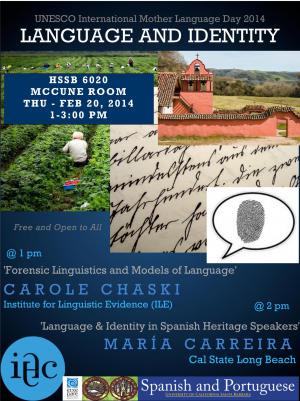Event Date:
THURSDAY, FEBRUARY 20, 2014 - MCCUNE ROOM, 6020 HSSB - 1-3 PM
It is becoming a tradition that the Department of Spanish and Portuguese commemorates UNESCO's International Mother Language Day (this is our third year) with lectures and conferences that look at the legal, historical, and social implications of language use, with special concern for minority languages and the linguistic rights of those communities that speak them.
The focus of the conference this year is on “Language and Identity.” The two speakers for this year will look at language and identity from different points of view - Dr. Chaski will look at models of language for forensic identity in the sense of 'identification,' and Dr. Carreira at the importance of language for the identity of Spanish heritage speakers, as well as for society at large and for departments of foreign languages specifically.
UNESCO'S INTERNATIONAL MOTHER LANGUAGE DAY 2014 - 'LANGUAGE AND IDENTITY'
Every year UNESCO observes the International Mother Language Day on February 21st, in remembrance of the students that died in Dhaka (Bangladesh) during the Bengali Language Movement protests in 1952. UCSB’s Spanish and Portuguese Department commemorates this day with a yearly conference. This year it will take place on Thursday, February 20th (McCune Conference Room, 6020 HSSB) from 1:00 pm to 3:00 pm. The conference aims to promote multilingualism, awareness of the plight of language minorities, tolerance towards different cultures, and the preservation of linguistic diversity. The focus of the conference this year is on “Language and Identity.” The two speakers for this year will look at language and identity from very different points of view - Dr. Chaski will look at models of language for forensic identity in the sense of 'identification,' and Dr. Carreira at the importance of language for the identity of Spanish heritage speakers, as well as for society at large and for departments of foreign languages specifically. This event is sponsored by the Barandiaran Chair of Basque Studies, the Basque Etxepare Institute, the Department of Spanish and Portuguese, the Department of Linguistics, and the IHC.
For Carole Chaski's lecture specifically:
Forensic Linguistics and Models of Language
Many types of legal incidents involve language as evidence in some way. These legal incidents might be crimes such as murder, kidnapping, rape and assault or civil actions such a tortuous interference, trademark and patent infringement, evidence tampering: such cases can involve anonymous messages, suicide notes, or threats that lead to both investigative and probative evidence. The field of forensic linguistics --linguistic analysis applied to these kinds of legal incidents-- covers four broad areas: identification, text-typing, intertextuality and linguistic profiling. How these problem are handled depends on the model of language that guides the analysis. Three models of language that influence forensic linguistics are prescriptive grammar, the bag of words, and linguistics. This talk argues that the most reliable forensic linguistics is grounded in linguistics,. exploiting a model of language that explains linguistic structure, behavior and capacity. Case examples include criminal and civil investigations that concerned both monolingual and multilingual evidence.
Carole E Chaski is the Executive Director of the Institute for Linguistic Evidence (ILE), the first nonprofit, scientific organization devoted to developing and testing linguistic methods for solving questions with forensic significance. Since 1998, ILE has provided a venue for research partnerships and data collection in forensic linguistics. Dr Chaski earned her AB in Ancient Greek and English at Bryn Mawr College, MEd in Psychology of Reading at the University of Delaware, MA and PhD in Linguistics at Brown University. She held a Visiting Research Fellowship at the US Department of Justice National Institute for Justice for three years prior to founding ILE. Since 1992, she has consulted on over 50 cases, testified in Federal and State courts, consulted in international tribunals, and published over 50 books chapters, articles and conference abstracts in computational linguistics and forensic linguistics. She is a Fellow of the American Academy of Forensic Sciences and in the Leadership Circle of TALE: The Association for Linguistic Evidence.

